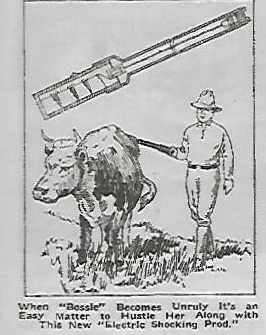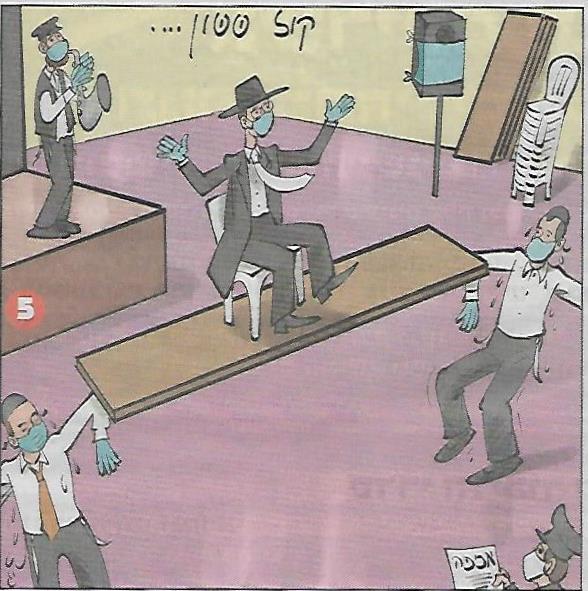  |
|
| |||||
This Google Custom Search looks only in this website. Shocking Problems about Shechita
For many generations and up to present times, our foremost poskim had to deal with the demand of the various governments to halt shechita according to Halochoh, which was termed "the decree against shechita." Often the authorities called for stunning livestock before the slaughter by electric shock, as is done by gentiles, while poskim are convinced that the shock is not a step towards the shechita and killing the animal, but it directly causes the death of the animal.
Pressure is mounting in various countries to implement the shock procedure due to the demands of organizations against animal cruelty. This has brought certain communities to try to find a less drastic solution of a weaker stunning with a lower electric voltage, so as to placate the authorities as well as the organizations to help animals.
Over a century ago, Dr. Shlomo Lieben, an expert physician from Prague, attempted the shock treatment with lesser voltage to bring animals to a prone position so that the shock would not cause the animal to be treif. But his experiments only proved that shock treatment of even minimal electric current could not avoid a serious danger of treifos.
Similar experiments were tried in many countries throughout Europe, the results being altogether the same. The opinion of the author of "Sridei Eish", who originally leaned towards allowance of stunning animals, later retracted.
For all purposes, all poskim throughout the world have forbidden this procedure in any way or form.
Famed Yated cartoonist Rabbi Yoni Gerstein had a number of things to express about behavior in the Covid-19 epidemic, and he did so in his inimitable way.
On Tuesday June 30, a plaintiff group led by the Association of Jewish Camp Operators, AJCO, as well as parents of potential campers, presented oral arguments in their case against New York State Governor, Andrew Cuomo.
AJCO, founded by Agudath Israel of America to represent the interests of the Orthodox Jewish summer camp community and parents, are requesting a temporary restraining order and preliminary injunction allowing overnight camps to open this summer.
Dovid Hamelech said that he always kept Hashem in sight. Dovid Hamelech had an unusually close relationship with the Ribono Shel Olom but nonetheless, after all this he still had things to learn about proper conduct in a beis medrash. The Mashgiach HaRav Meir Chodosh zt"l said that he was so grateful and appreciative of someone who taught him just two things, that he called him his rebbe and his commander and his teacher.
It was Achitofel who saw Dovid sitting alone and learning, and he asked him why he was sitting alone when it says, "A sword to those who are alone." And Dovid Hamelech accepted the criticism.
From Our Archives
Beware of Bilaam and His Talmidim: Every Intention of a Rosho is for Evil
by the Tzanz-Klausenberg Rebbe, zt"l
This speech was given by the Tzanz-Klausenberg Rebbe, zt'l, at a meeting of educators in the year 5732 (1972). The Rebbe's yahrtzeit is 9 Tammuz. The Rebbe was a Holocaust survivor who had very extensive and bitter experience of the worst excesses of Israel's enemies.
The first rule for self protection is "know your enemy." This rule can be divided into two parts: 1) Knowing who the real enemy is; 2) Analyzing his plans and how he executes them.
If one ignores this advice, the war is lost. The Torah, having commanded us "Remember what Amolek did to you," added "Do not forget" alluding to the above: knowing the enemy and his schemes.
Chazal (Midrash Rabbah parshas Vayishlach, also cited in Rashi) tell us, "R' Shimon bar Yochai said the halochoh is that Esav hates Yaakov." Every non- Jewish idol-worshiper, no matter where he lives, how he dresses or looks, and in any situation, hates Jews [at least potentially]. The Jewish tradition has long taught us to respect the idol worshipers but to suspect them as well.
Dovid Hamelech a'h writes (Tehillim 139:21,22), "Do I not hate, Hashem, those who hate You? And do I not quarrel with those who rise up against You? I hate them with the utmost hatred; I count them as my enemies." We always understood that it is dangerous to become friendly with those who wish to harm us.
Relating to Extreme Emergent Ruchniyus
by R' Zvi Zobin
Levi decided that he needs to serve Hashem with total devotion. He became a tremendous masmid. He kept mitzvos with meticulous care and davened with total kavona.
After a while, Levi felt himself developing a real relationship with Hashem. He felt himself interacting with the world on a higher level. "Chance" occurrences made sense and he felt himself being guided to a higher purpose.
Levi tried to describe his experiences to people, but they brushed him aside. People told him he was becoming too intense, too frum. But he knew that Hashem wants a person to serve Him with total devotion since that is what he had been told by his teachers and that is what he had read. Levi stood his ground and he felt himself become closer to Hashem. At the same time, he felt himself becoming more and more estranged from his family and friends and he threw himself into his devotions with even more fervor.
After several months, Levi crashed.
EARLIER EDITORIALS
A Mission to Spread
Daas Torah
Looking for the
Best in Yiddishkeit
The Immorality
of Palestinian Combatants and Noncombatants
|
|||||




.jpg)

